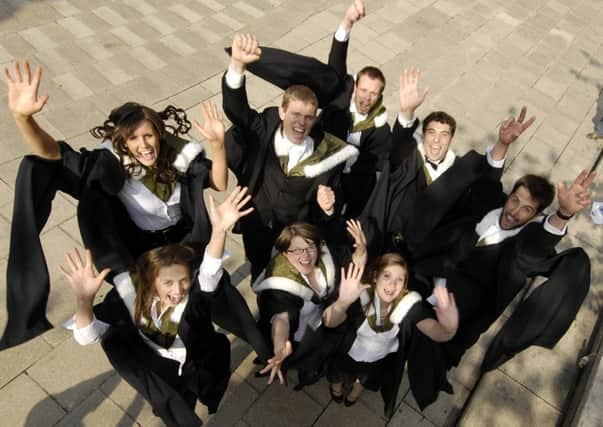Scots women top of class for university degrees


New figures show Scotland ahead of the other home nations among those leaving UK universities with a first-class degree or 2:1 in 2014.
Data from the Higher Education Statistics Agency (HESA) also found that women are more likely to get those top degrees, as the number of firsts awarded in the UK has doubled overall in the past decade.
Advertisement
Hide AdAdvertisement
Hide AdThousands more undergraduates met such high standards last year than in the previous 12 months.
But figures also show a decline in overseas students from some key countries studying in Scotland, blamed on changes to immigration rules introduced at Westminster.
A total of 74 per cent of Scottish students left university with a first or upper second degree, compared to 71 per cent in Northern Ireland, 70 per cent in England and 65 per cent in Wales. Within that, 77 per cent of female graduates finish with a first or upper second degree compared to 71 per cent of male students. Northern Ireland saw the biggest gender gap, with 72 per female versus 60 per cent male.
More than 5,100 Scottish students gained a first last year and another 13,000 received upper seconds, out of total of 15,000 students.
A number of universities are introducing or trialling the Higher Education Achievement Report (HEAR), an electronic document that gives a more detailed record of a student’s achievement alongside their final degree classification.
CONNECT WITH THE SCOTSMAN
• Subscribe to our daily newsletter (requires registration) and get the latest news, sport and business headlines delivered to your inbox every morning
Nicola Dandridge, chief executive of vice-chancellors’ group Universities UK, said: “With changes to the student funding system and increased graduate contributions, there is evidence to suggest that students are working harder than ever to get their degree results.
“However, the sector has recognised for some time that the current degree classification system is a blunt instrument; hence the trialling of the HEAR and grade point average system at a number of universities.
Advertisement
Hide AdAdvertisement
Hide Ad“The aim is to provide a more detailed account of what a student has actually achieved during their studies, rather than just a one-off degree classification.”
The total number of UK students decreased at Scottish institutions by one per cent, while non-EU domiciled students rose by one per cent. The largest number of students from the rest of the EU came from Germany, and from China in non-EU nations.
The number of students from India dropped by 21 per cent.
Universities Scotland renewed calls for a post-study work visa to keep international students in the country after graduation.
Alastair Sim, director of Universities Scotland, said: “Scottish universities need action from government to improve its post-study work offer.
“We are losing out in key markets as our competitors take steps to attract more international student talent.”
SCOTSMAN TABLET AND IPHONE APPS